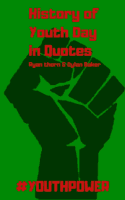As Youth Day comes around, and in the middle of this year’s Youth Month, it is the perfect time to look at the history of this date over the decades. A day that has been moulded by its country’s development, Youth Day has held different moods and meanings through the years. This Youth Month, we’ll look to the past and the now to see how this turning-point-turned-holiday started and developed over time.
1976
“The police have been instructed, regardless of who is involved, to protect lives and property with every means at their disposal. This government will not be intimidated and instructions have been given to maintain law and order at all costs.” -Prime Minister Vorster, 1976
Youth Day was a turning point in the history of South Africa. June 16, 1976 is the date of the Soweto Uprising. The uprising was a result of students peacefully protesting a law passed by the apartheid government that made Afrikaans the language in which maths and social studies would be taught in schools. This hurt students’ ability to learn, and they took to the streets to protest. While on the way to Orlando Stadium, soldiers opened fire on the marching students. The government soldiers committed senseless and unnecessary violence in the name of “maintaining law and order”. The students involved in this tragic incident were acting on what they believed in, and, when the government’s treatment broke all expectations, they paid a price for a bargain they didn’t make. The sacrifice and bloodshed of these students must be remembered for being a turning point in the apartheid struggle, inspiring sanctions from other countries, and increasing the push for true democracy.
1995
“Today, we can proudly say that we have given a fitting tribute to our young heroes. June 16, South Africa Youth Day, is a paid public holiday. We celebrate June 16, 1995 after our first Freedom Year, with new and bigger challenges facing the youth. You were in the forefront of the liberation struggle. Today you must be in the forefront of reconstruction and development.” – Nelson Mandela, June 16, 1995
Youth Day was officially declared a paid public holiday in 1995. This was the second year of South Africa’s new democracy under Nelson Mandela’s leadership. In his 1995 speech for the first ‘Youth Day’, Nelson Mandela described the day as a “fitting tribute to our young heroes” and laid out a central message of invigorating the future of South Africa’s youth through education and skills development. By illustrating the vitality of young South Africans in securing a future of opportunity, he placed them at the forefront of his plan for reconstruction and development. Thus, at the birth of Youth Day by its now-known name, chimes of recognition rang for the past and declarations of hope sounded for the future.
2016-17
“You are fantastic, do you know that? Our freedom, in a very large measure was due to what young people such as yourselves did 40 years ago not very far from where we lived in Soweto where Hector Pieterson was shot and killed. But you are fantastic. Reach for your stars, because now you can be anything and everything you want to be. We are proud of you and that you don’t allow circumstances to keep you down, you say they are not obstacles, they are challenges”- Desmond Tutu, June 16, 2016
Today, Youth Day is celebrated by many as a chance to focus on youth-related issues and to empower the young people of South Africa, as did Desmond Tutu when he addressed the youth festival in Cape Town last year. This Youth Month marks the 41st anniversary of the Soweto Uprising and has the theme “The year of OR Tambo: Advancing Youth Economic Empowerment”.
There are many economic and social challenges to the youth of South Africa today. Let Youth Day remind us of where we have come from, and where we want to get to. Let us all support the youth in their development – after all, young people are our future.


